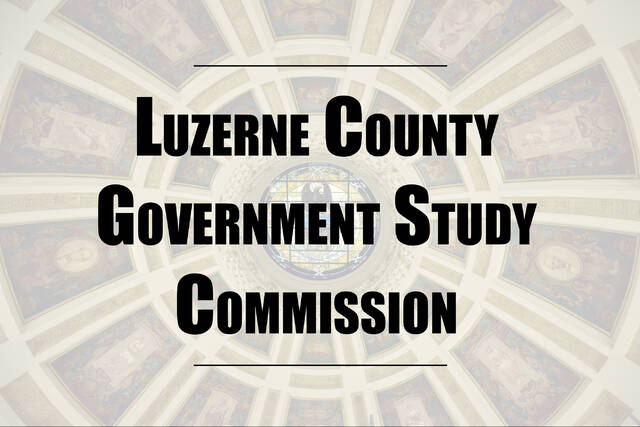Public hearing set for June 17
With the caveat that changes can still be made, six of the seven Luzerne County Government Study Commission members voted Thursday to recommend a draft revised county home rule charter that was hammered out over the past year through majority vote.
Affirmation was necessary because this version will be the subject of the commission’s first public hearing, set for 6 p.m. Tuesday, June 17, at the Luzerne County Operations Building, 1199 Wyoming Ave., Wyoming.
The commission discussed plans to hold at least two more public hearings in other regions of the county to obtain feedback before it locks in the final package, which will be put before county voters for possible adoption in the November general election.
Voting in support of the draft version were Commission Chairman Ted Ritsick, Vice Chairman Vito Malacari, Secretary Matt Mitchell, Treasurer Cindy Malkemes and members Tim McGinley and Stephen J. Urban.
Commission member Mark Shaffer said he won’t support the draft for reasons previously cited — the possibility of elected officials serving on the county election board, which consists of five citizens, and the decision to give county council latitude to determine how the county ethics commission is eventually structured instead of mandating a specific composition in the revised charter.
Malacari said he encourages Shaffer to formally present alternative proposals for the commission’s consideration.
Urban argued council members should be entrusted to make such decisions regarding both boards because they are elected by a majority of county voters to serve as their legislative representatives.
Shaffer said he is thinking of the ramifications if the county ends up with an unsatisfactory council in future years and maintained the changes he is opposing are “critical flaws” that would prevent voters from approving the revised charter.
Urban said he will encourage voters to approve the revised charter because he is confident it greatly improves the current one in effect since 2012. The commission spent hundreds of hours working in a bipartisan manner to make changes, he said.
Malkemes said she agrees with Shaffer’s criticism of the draft document but supports its approval because it is not the final version.
McGinley said strong commission majority approval of the final product will be necessary to convince voters to adopt it in November. As a result, the commission must continue work on aspects prompting division, he said.
Ritsick thanked his colleagues for collectively working to produce a draft.
“Today’s a milestone,” Ritsick said.
The commission also reached majority consensus Thursday on how the county would transition from 11 to seven council members.
Presented by Malacari, the approved plan would require voters to still elect six council members in 2027 but provide four-year seats to the top highest vote-getters and two-year seats to the candidates with the fifth and sixth highest vote tallies.
In the 2029 election, voters would choose three council members instead of five. That reduction and the expiration of the two-year seats would bring council to seven members at the start of 2030.
This plan would keep council at 11 members until it is cut to seven in 2030 and was approved by Malacari, McGinley, Malkemes and Shaffer.
Mitchell, Urban and Ritsick did not support that proposal. Urban had advocated for another option to start implementing the reduction sooner by electing four council members instead of six in 2027 and three instead of five in 2029.
Ethics commission
The study commission also partially agreed Thursday on a change intended as a compromise regarding the ethics commission.
Under its original recommendation, a commission majority had agreed to require council to decide within a set time period if it wanted to keep the existing ethics commission and code or revise the code and composition of the commission.
The commission is currently composed of the county district attorney, manager, controller and two council-appointed citizens (one Democrat and one Republican).
Instead, a study commission majority voted Thursday to require the county to implement the following commission structure for at least two years: keep the DA, manager and controller and expand the citizen membership to four registered voters approved by council (two Democrats and two Republicans).
The premise is that citizens would outnumber the elected officials and manager for at least a trial period.
Council would still be free to alter the structure after two years.
Malacari, Malkemes, Urban and Ritsick approved this change. McGinley, Mitchell and Shaffer did not.
The commission discussed but temporarily held off on voting on another compromise proposal to create an advisory committee including citizens to make recommendations on ethics code changes.
Reach Jennifer Learn-Andes at 570-991-6388 or on Twitter @TLJenLearnAndes.




